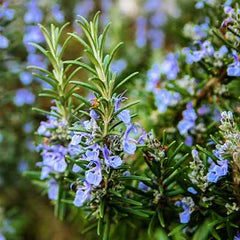Rosemary
An Uplifting Botanical for Skin and Scalp Health
Rosemary, Rosemarinus officinalis, often called “dew of the sea,” is a fragrant evergreen herb with a long history of culinary, ceremonial, and practical use. Traditionally associated with memory, fidelity, and clarity, rosemary has been used for centuries in food preservation, personal care, and herbal remedies.
Like many aromatic herbs, rosemary contains naturally occurring antibacterial and astringent compounds. Before refrigeration, rosemary and similar herbs were rubbed into fresh meat to help slow spoilage—an early recognition of their antimicrobial properties. These same properties make rosemary useful in skincare and scalp care, especially for oily, congested, or imbalance-prone skin.
Rosemary also contains rosmarinic acid, a plant compound known for its anti-inflammatory activity. When used topically, rosemary helps calm irritated skin, support clearer pores, and encourage healthy circulation—benefits that extend to both skin and scalp care.
Its fresh, herbaceous aroma has long been valued for its uplifting and mentally clarifying qualities. Rosemary is traditionally used to help ease mental fatigue, tension, and sluggishness, making it a popular botanical in products designed to refresh both body and mind.
Topical Skin Benefits of Rosemary
Rosemary is especially helpful for skin that benefits from gentle toning, cleansing, and circulation support.
- Soothes Inflammation & Redness: Naturally occurring anti-inflammatory compounds help calm irritated skin and support comfort in conditions such as acne, eczema, and rosacea.
- Astringent & Toning: Rosemary gently tightens pores and helps regulate excess oil production, making it useful for oily or combination skin.
- Antibacterial Support: Helps cleanse pores and reduce acne-causing bacteria without stripping the skin.
- Supports Healthy Circulation: Encourages blood flow to the skin’s surface, supporting a refreshed appearance and healthy tone.
- Gentle Exfoliation: Finely ground rosemary leaves add mild exfoliation when incorporated into natural soap, helping remove buildup and dull surface cells.
Hair & Scalp Benefits of Rosemary
Rosemary has a long-standing reputation in hair care, particularly for scalp stimulation and overall hair vitality. It has been used for hundreds of years in traditional remedies to promote hair health. It encourages hair growth and strong, healthy hair by improving blood flow to the scalp. Rosemary also has antibacterial and antifungal properties that help soothe the scalp.
- Supports Hair Growth: Improves blood flow to the scalp, delivering nutrients to hair follicles and creating a healthier environment for growth.
- Soothes Scalp Irritation & Dandruff: Anti-inflammatory and antimicrobial properties help ease dandruff, itchiness, and scalp irritation.
- Strengthens Hair & Reduces Breakage: Nourishes follicles and supports stronger, more resilient strands.
- Adds Shine & Improves Manageability: Rosemary tea rinses and infusions help smooth the hair cuticle, reduce buildup, and add natural shine.
- Balances Scalp Oils: Helps regulate sebum production, addressing both overly oily and dry flaky scalps.
- Antifungal action: Rosemary compounds fight Malassezia, the common fungus linked to dandruff. (Source)
- Improves circulation: Boosts blood flow to the scalp, delivering nutrients and promoting overall scalp health.
The uplifting scent of crushed rosemary leaves is believed to help with headaches, mental fatigue, nervous exhaustion, and stress. It clears the mind and promotes mental clarity. It refreshes and stimulates a warm, sluggish body, energizes, and regenerates.








